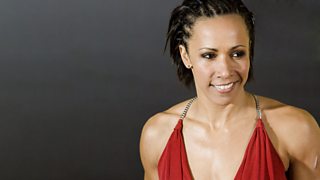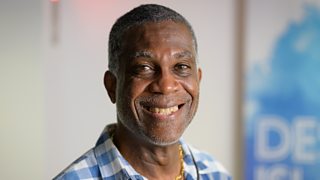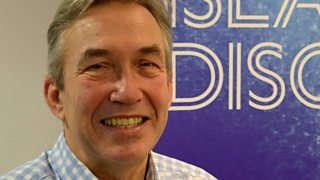Seven things we learned from Ellie Simmonds's Desert Island Discs
The swimmer Ellie Simmonds was just 13 years old and the youngest competitor at the Beijing 2008 Paralympics when she won her first two gold medals. She immediately gained national attention, and became the youngest person ever to receive an MBE a few months later. She went on to win two more gold medals in London in 2012, and another in Rio four years later, setting world records on the way. She announced her retirement from competitive swimming last year at the age of 26. She was also joint Star Baker in the Great Comic Relief Bake Off in 2013.
Here’s what we learned from her Desert Island Discs...
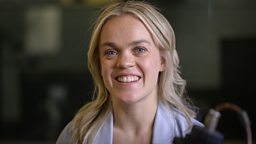
1. She was called the ‘poster girl’ of the London 2012 Paralympics – and it was quite a poster
"I remember being in the Paralympic Village and other teammates and athletes,” Ellie says, “And I had not been to the Aquatics Centre [the pool with the wave-like roof] yet, we'd been training at a different pool in London - and I remember everyone was like ‘Wow Ellie, your face is on this massive poster’. I was like, ‘Oh, that's cool,’ like I was trying to stay focused. But then I remember going on the bus and saw the side of Westfield [shopping centre] - I was like ‘Blinking Nora! That is a huge photo, isn’t it?’”
2. Swimming was the centre of her life from a very early age
“We're a very active family,” says Ellie. “I think [swimming] was everything. I got an amazing social life there. I got friends swimming at Boldmere Swimming Club. I remember going to Wyndley Leisure Centre half-an-hour before my training would begin so we could play in the changing rooms and run outside, run up and down, then swim in the pool for about an hour or an hour-and-a-half depending on the time."
"I would always be the last one in the changing rooms because I was playing, but I think for me swimming was just... It's that clearness, there's no impact on the body. It's very much the buoyancy, the feeling of freedom in the water... I was just able to just go up and down, up and down, not thinking about anything, that freedom, being able to perfect the strokes, thinking about the drills. I was, and I'm a perfectionist even now.”
3. One of her music choices takes her back to lockdown and gym sessions in the kitchen
When the first lockdown was announced in 2020, Ellie’s coach advised her to escape London “for a bit”.
“So I go home to my parents’ house in Aldridge for a weekend not thinking that four months later I'd still be there. We had four months where we weren't able to access swimming pools; there was the uncertainty of whether the Paralympics were going to be on...”
“And then finding out they were delayed a year and I was just able to stop. I was able to just be with my parents, and it was just amazing - we got so close. I turned their kitchen into a bit of a gym because of no access to a swimming pool.”
“I remember putting headphones on in the mornings. I would do a gym session and would work out, and this song [playing]. I remember rapping to it and it just reminds me of that lockdown era, doing pull-ups in my parents door frame,” she says, laughing.
The song is Own It by Stormzy (featuring Ed Sheeran and Burna Boy).
4. Her Olympic dream began in front of the TV when she was nine years old
“I remember sitting on the sofa watching Athens 2004 Olympics. I remember Kelly Holmes coming away with two gold medals and it just being absolutely incredible. But then sitting on the sofa watching Athens 2004 Paralympics, watching Nyree Lewis swim her 100 metres backstroke S6. I remember seeing her get her gold medal.”
“And I said to my mum, ‘Oh, how old you have to be to go to a Paralympics?. What do you have to do?’”
“And she said ‘You just have to be really good. I think you could go at any age.’“
“That moment was, like, I want to be a Paralympian. I want to get a Paralympic gold medal, that is my dream. It started on that sofa.”
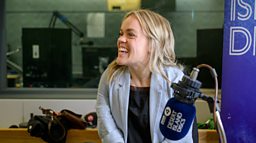
5. As a young swimmer she knew who she had to beat – and kept their names in a notebook
Ellie is “very focused when I'm in the pool, a bit selfish, I think. I notice that more and more now that I've left. I’m very, very competitive.”
I had a whole list of all the swimmers that I wanted to beat and I used to tick them off every time I won
“I remember as a kid before Beijing 2008, I had a whole list of all the swimmers that I wanted to beat and I used to tick them off every time I won or beat them.”
"I wasn't like that later on in my career,” Ellie adds with a smile.
6. Motivational music was vital in her race preparation – especially a track by Eminem
“Before you're about to race,” explains Ellie, “You and your seven or eight other competitors go into the call room 20 minutes before you're about to get called out behind the block. I used to listen to music in the call room and this song would be the last song that I would listen to before my name would get called out.”
“People probably see my persona on the surface, calm, ready, but on the inside I would be so nervous, so, so nervous and shaking. I remember sometimes feeling like, ‘Why am I putting myself through this?’ But that song reminds me: ‘This is why I do it.’”
“You've just got to go out there and give it everything you’ve got. So my competitiveness is linked to this song, and it's so funny because now I don't really like listening to the song... But this is the song where, if you want to go and get something done, you listen to this.”
The song is Eminem’s Lose Yourself, which opens with the lines ‘Look if you had one shot or one opportunity to seize everything you ever wanted in one moment, would you capture it or just let it slip?’. It’s Ellie’s fourth desert island disc.
7. After retiring from swimming, Ellie has reported on a controversial new drug treatment
Ellie has recently presented a documentary on 大象传媒 One called A World without Dwarfism?, exploring a new treatment for achondroplasia, the genetic condition she was born with.
When she first heard about the treatment, her feelings were very clear: “I was not a fan. I got really, really angry... I was like why do we need a drug that is going to change us?”
“I wouldn't be where I am if I hadn't got dwarfism, I wouldn't have met the people that I have and to have the community - and it’s an amazing community. And my partner, the love of my life, I met him at the charity, and it's brought so many people together. And is this drug going to change that?”
“And why would an adult make that decision for their child to have an injection every single day to change them? And most of all, it was the unknown, what actually is this drug? And I wanted to find out.”
“I wanted to go quite neutral because I wanted to learn. I thought we were at a time of our lives where we're accepting people who are different - either religion, race, colour, disability, but still there's so much more we can do, and that's not just with the Paralympics, but that's in society.”
"But this drug is always going to be there, isn't it? It's never going to go away now. We've just got like help people who are making that choice to maybe not go down that path, to realise: ‘Yeah, it's amazing that your child's got dwarfism, or it's different. They can live the most amazing, happy life, they can lead a healthy life. They don't need to inject themselves every single day to be happy. They can be OK without it.”



